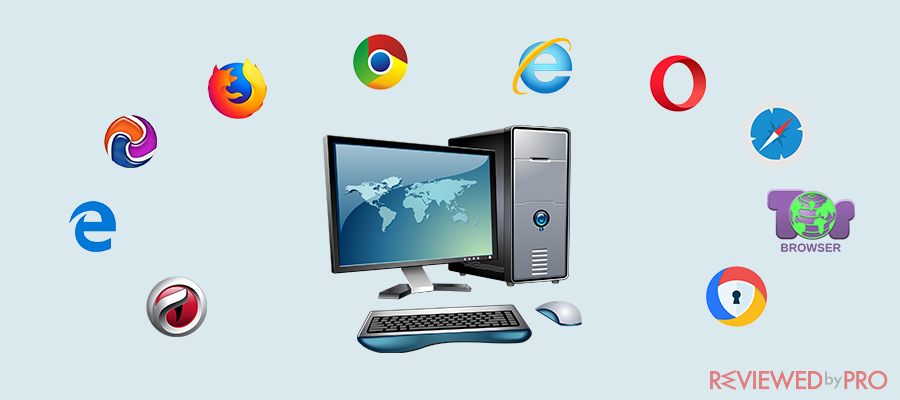For this, you need to use a VPN to hide your IP address, and various browser add-ons to prevent web tracking (which may or may not be bundled with the privacy browsers discussed above). All the browsers in this list are open-source and provide much more privacy than Chrome, Edge/Internet Explorer, or Safari.
There are so many browsers that claim to be secure and private that it's getting harder to notice the difference and benefits of each. Thanks for including the last part about the alternatives. As a thumb rule, always delete cookies and then disable cookies in your web browser settings to enjoy a secure web browsing. Plug-ins / Extensions Many times you may opt for third party plugins or browser extensions for increasing the functionality of your browser or perhaps to block irrelevant ads and pop-ups. Tor web browser - the most secure and privacy-oriented web browser Those looking for an extremely safe web browser, but are less concerned about its performance, are strongly recommended to use Tor. This web browser is a subsidiary or a version of Mozilla Firefox, except that its.
The area you are entering is intended for active associates of The Kroger Co. family of companies. Log in with your ID and password to continue. Click I AGREE to indicate that you accept the Company's information security policy. You are entering the ExpressHR Application. If you click the I AGREE button, changes you make in this application will be changed in all applicable Kroger and external systems. Any changes made to direct deposit elections will be sent to the applicable financial institutions.
|
A web browser is a standard application on every mobile phone, PC, and laptop for accessing the Internet. Be it a home user or a business owner; web browsers are the most common gateways for hackers to get into your system and hack your data. In this ultimate guide, I'll be covering steps on how to secure web browsing in most used web browsers around the world.
But first, let me tell you why.
Many web browsers like Apple Safari, Mozilla Firefox, Google Chrome and others come loaded with tons of features. However, they may compromise the security that is essential for secure web browsing.
Ignoring to take the necessary steps to protect your web browser is a mistake every user is guilty of making at least once. These vulnerable web browsers are always the prime focus of software attacks by using malicious and compromised websites.
And, it gets even worse.
There are a lot of factors in play here that contribute to the vulnerability of web browsers.
Some of these factors include:
- Most Internet users tend to click on links without considering the risk it may pose.
- Web page URLs can be masked to resemble secure sites. As an example, hsbc.com may be visible as hs6c.com. In a hurry, you may not notice the minute details, and this fake site will steal your financial credentials.
- Often third-party software do not receive the necessary automatic updates.
- Many users don't know how to browse the Internet securely.
- Most websites ask you to download third-party add-ons or applications for full functionality. In addition to being risky, it may also attack your system with malware.
- Add-ons like ActiveX, Javascript, Java pose a threat to your system as they are vulnerable to malicious attacks.
Given these points above, it becomes necessary to learn how to secure web browsing to keep yourself and sensitive information securely over the Internet.
In this ultimate guide to secure web browsing, I'll be covering the following sections:
Now, let's get started.

1. Web Browser Features & The Associated Risks
Your web browser is the window through which hackers try to peek in and steal sensitive information like your data, bank account details, credit card details, etc.
Many surveys conducted have resulted that web browsers pose a massive risk where your web security is concerned. Consider this a low-cost method used by attackers to hack into your system. They may do so by injecting a trojan virus into your system or use spyware methods to take control of your information.
In this section, I'll cover various features of a web browser and their associated risks for better understanding and configuration of your web browser for a safe and secure web browsing experience.
Let's begin
If you're familiar with the technology, you'll know. ActiveX has now become an obsolete technology that is hardly ever used nowadays. Earlier, ActiveX was used to run applications or in-part some applications on your web browser. This functionality of traditional web browsers but in return increased the number of vulnerabilities for naive users.
If you're a Windows user, read this part.
Most Windows applications will install ActiveX tools even you never use them. One major problem with using ActiveX is how it increases your PCs possibility of an attack by 110%. It comes preinstalled with browsers like Microsoft Edge and Internet Explorer.
Here's my tip:
Just deactivate ActiveX and enable it only for websites that are highly-secure and cannot do without it.
A programming and scripting language, JavaScript is used to improve the functionality and responsiveness of a website. Most banner advertisements, annoying pop-up ads and many other spam elements you see on the web page appear with the help of JavaScript.
Let me quickly brief you the problems JavaScript and other scripting languages bring in your system:
- Cross-Site Scripting: Also called XSS, this is a serious vulnerability in your web browser that can help the attacker to misuse the trust you may have with few sites you frequently visit.
- Cross-Domain Vulnerabilities: Many web browsers have implemented security models as a part of secure web browsing mechanism to prevent certain scripts from running on selected domains.
Scripting languages can be used to violate these security standards, and the attacker can get into your local machine to run commands without your knowledge. - Evade AV: Scripting languages can be used to bypass the Antivirus and other Intrusion Detection system. It will give the hackers ample opportunity to get ahold of your system.
A simple suggestion: Disable JavaScript in your browser and enable it for selected secure sites that you need and know can't function without it, for ex: Youtube.
Now I am not talking about cookies that you eat per se.
In web browsers, cookies are small files that are stored to keep your information like usernames and passwords, web history and the sites you frequently visit.
Now in all browsers, by default cookies are enabled. However, you should know there are two types of cookies: First-party and third-party. While the site keeps first-party cookies, you visit to keep session log, and more. Third-party cookies are often used by advertisers to track your online behavior and choices.

As a thumb rule, always delete cookies and then disable cookies in your web browser settings to enjoy a secure web browsing.
Many times you may opt for third party plugins or browser extensions for increasing the functionality of your browser or perhaps to block irrelevant ads and pop-ups. Although they help you block ads, even these add-ons can increase the risk of malware and virus attacks on your system.
Now, let's get to our next section.
2. Settings To Secure Web Browsing for Chrome, Safari, Firefox, and Internet Explorer
In this section, I'll tell you how to secure web browsing by configuring your web browser with settings and options. This article will help you reduce the vulnerability of your web browser and ultimately have a safer browsing experience.
As an additional read, I'll also recommend reading about security and privacy settings of each of the browsers installed on your system for updated information. For your ease, I'll be sharing the tutorial links as well.

Let's start with Google Chrome
In the top right corner, select the three vertical dots from your Chrome Web browser. Now select Settings.
If it's your PC, you may have signed in Chrome. Click on: Sync.
Now from the list of options, go down to Encryption section. Now check Encrypt synced data with your own passphrase. Now enter your Passphrase and Enter it again to confirm, click on Save. This setting will add a double layer of protection to your data and auto-fill information.
Generally speaking, if a hacker gets his hands on your password, they won't be able to get your synced data without knowing the passphrase.
Now move to Advanced Settings option by clicking Advanced.
In the privacy section, do the following:
Check the option that says 'Send a 'Do not track' request with your browsing traffic.' Now, this is a small tweak, but it'll disable most websites from tracking your browser activity.
Under subsection Content Settings,
Click on Cookies and Enable 'Block third-party cookies'.
Now go back to Content Settings and click on JavaScript and disable the Allowed button.
Now, this may cause you to remember a lot of your browser choices manually. But your attackers and annoying advertisers and spammers will not be able to snoop around for sensitive information.
It's all your choice!
Coming to Passwords and forms section, uncheck these two options:
Secure Web Browser For Mac
Click on Autofill Settings and disable the On button.
Go back and click on Manage Password and disable the On button.
It is a highly recommended setting. It may cause you to enter the password every time you visit any site manually. But it will be worth the hassle as hackers won't find easy access to your passwords implementing it.
Now, from plug-ins section, select the option, Let me choose when to run plugin content. This action will allow you to be selective with the plugins you want to run on your browser.
For additional configuration options, you may visit the Google Chrome Help to learn about control of privacy and security in detail.
From your Safari Browser, select Preferences.
Now click Privacy. Select Cookies and Websites Data. Check option Always block. This action will let Safari know to not allow any website to keep track of your browsing activity or store any information.
To remove already stored cookies and data. Click on Remove All Website Data.
You may want to do private browsing. Just click on File> New Private Window.
It is quite similar to the incognito window in Chrome. When you enter a private window in Safari, it doesn't keep track of your browsing history and also asks sites not to track you.
For additional settings, visit Safari Help here.
Are you a Firefox user?
Let's get your Firefox secure then.
Select the three vertical lines on the top right corner. Click Options.
In the General Section, Enable the radio button: Always ask me where to save files.
This action will avoid saving of any downloaded files onto the computer system without prior knowledge.
Now move to Privacy settings.
The first option you'll see is Tracking. Click on the 'Manage your Do Not Track Settings.'
Now enable the option 'Always apply Do Not Track.' Click Ok.
In Security settings, check the following options:
- Warn me when sites try to install add-ons
- Block dangerous and deceptive content
- Block dangerous downloads
- Warn me about unwanted and uncommon software
These are just some of the ways to ensure secure browsing on Mozilla Firefox. To get into more details, visit Mozilla Support page and provide a safe browsing environment always.
Internet Explorer Settings for Secure Web Browsing

We rarely use Internet Explorer these days. However, if you're in love with Internet Explorer, you may visit Internet Explorer help page to learn more about configuring your web browser. Press F1 button to open help page. This action will prevent malicious hackers to get access to your browsing history and activities.
3. Add-ons / Browser Extensions Suggestions for Secure Web Browsing
As noted above, Browser add-ons or extensions are used to improve and enhance the functionality of existing web browsers. You may install these add-ons for an additional benefit.
1. AdBlock Plus
This is quite a popular browser add-on for disabling pop-ups and ads from appearing on your web browser. While you may select to disable JavaScript partially, this add-on will help to disappear annoying advertisements for a clean browsing experience.
It is another popular browser extension that blocks third-party cookies and browser activity tracking on every website you may visit.
I can't emphasize more about using HTTPS with every site URL. It ensures you are going to a secure site protected by SSL protocol on the web. This add-on implements HTTPs with every URL and website you'll visit on your browser.
4. General Tips and Hacks For Secure Web Browsing
Now, this is a common sense thing. An updated version of any software is improved to cover previous bugs and security loopholes. Your web browser is no exception. Always ensure that you have an up-to-date Web browser.
Additionally, make sure to update any browser extensions or add-ons that you are using as well.
Like you change your toothbrush every three months, remember to change your passwords as well. Passwords, as a rule, should be made using a combination of alphanumeric keys and symbols.
Secure Web Browsers 2020
Changing passwords frequently and using different passwords for all your email accounts reduce the chances of being attacked and compromising all your data at once.
An antivirus can detect any possible vulnerabilities and attack points in your web browser and system. It works by detecting 'bad patterns' and preventing them from accessing your data or blocking them altogether.
Invest in a quality antivirus for your system to limit the possibilities of an attack on your system.
4. Avoid using Public Networks or Free Wi-Fi Hotspots

Public networks or Wi-fi service that is available for free at many cafes and restaurants are the prime targets for hackers looking to get just a sneak-peak of vulnerable points of attack on your device.
Restrain from using these public networks to access sensitive information like net banking. And if you must, use private browsing for a layer of security.
Final Words on How you can Secure your Web Browsing
Which is the most secure web browser on the market? Answering it can be quite challenging and biased if I must say. However, with the advancement in technology and programming languages, the risks associated with using the Internet have also vastly increased.
Secure Web Browser Free
While nobody guarantees a 100% safe browsing, these tips can help you attain a pretty close level of security on your web browsers for secure web browsing.
Secure Web Browser Reviews
Did this article assist you? Or have I missed an important tweak?
Help others by sharing your opinions and suggestions in the comment section below.
